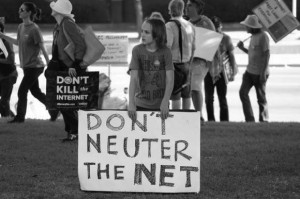Ben Winters, Staff Writer
Since it’s inception, the Internet has been a place where innovation is welcomed and where companies have equal opportunity for success. The end of net neutrality could mean companies with more monetary clout could control the playing field, an issue many other industries have faced. Some of the Internet’s most popular sites like Facebook, as well as some of the smaller online platforms that foster innovation, wouldn’t have been able to be created in the absence of net neutrality.
What exactly is net neutrality? It is the mandate that different sites, for example Hulu or Netflix, have their content delivered by service providers, such as Verizon or Comcast at the same speed. Why would anyone want to change that?

Service providers, like cable companies, see the end of net neutrality as an opportunity. Service providers could be paid any amount of money by some of these companies, such as Netflix, and then that company’s service would be delivered to customers at a faster rate, regardless of service provider or the type of service. This leads to companies having monopolies on a given market and a decreased air of innovation.
This topic has been consistently debated over the last few years, and on November 10, President Barack Obama weighed in via a video posted to the White House website. In his statement, he noted “Net neutrality has been built into the fabric of the Internet since its creation — but it is also a principle that we cannot take for granted. We cannot allow Internet service providers (ISPs) to restrict the best access or to pick winners and losers in the online marketplace for services and ideas.”
Although President Obama’s opinion has a larger impact than most, the decision whether to regulate Net Neutrality is in the hands of the Federal Communications Commission. The FCC is an independently owned agency that is not connected to the government and has no legal obligation to the president’s word. With that being said, Obama is just one of 3.7 million people who have submitted formal comments to the agency, as well as hundreds of thousands of others who have signed petitions.
Verizon, who controls a large portion of both wireless and wired communication in the country, has publicly been a proponent of ending net neutrality. Verizon responded to Obama’s proposal, calling it, “a radical reversal of course that would in and of itself threaten great harm to the Internet.” In addition, opponents of net neutrality hold that it “would impose inappropriate regulation on a dynamic industry and would threaten mobile providers’ ability to invest and innovate, all to the detriment of consumers.”
One thing to keep in mind is that the FCC’s impending decision isn’t necessarily black and white. There is a spectrum of strictness on the rules, however one thing that is certain is that it will be an impactful decision.
Leave a Reply